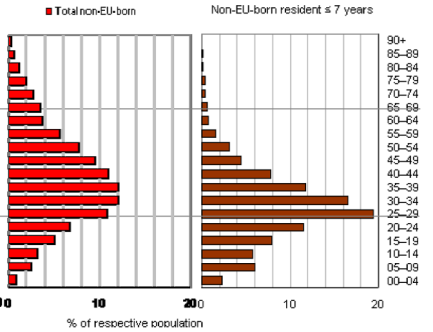Third Country migrants in Europe
In the EU more than two-thirds of all non-EU-born working age third country migrants originate from just four main source regions: Central and South America (20 %), North Africa (19 %), Sub-Sahara Africa (15 %) and South and South East Asia (14 %). Other sizeable shares of third country migrants originate from Balkan non-Member States, Eastern Europe, the Near and Middle East and Turkey.
In Latvia 17,4 % of the whole population are Immigrants. In Estonia 14,4 % come from third world countries. The lowest number of immigrants has Slovakia with 0,3 %.
As you can see in the picture above, most of the Migrants move to Europe when they are between 25 and 39 years old. Through this fact it gets clear that a lot of Employments are necessary because those years are the working years. With this a crucial problem comes up. Normally in the age of 25 people finished their studies or other educations, but if in the sector they are able to work no demand exists, it is hard to find a job. Another fact is that many people who are in the thirties and do not have any education are even harder to reintegrate into job life.
Barriers of labour market integration
There is a huge number of barriers coming up with Migration and the integration into job life. Migrant and employees have to deal with several problems depending on each country like: lack of language skills which actually is an important aspect for a successful integration, lack of professional and educational skills, recognition of qualification and diplomas, limited of knowledge of the labour market, limited social and professional network, discrimination of the origin people, working conditions, policy and other contextual barriers, the labour market situation and the State of flexicurity.
Solutions
One possible solution is educations and training of several skills such as languages, intercultural skills and knowledge about the labour market. Additionally Internships and networking are two important things for Migrants to get to know the labour market and its possibilities. Through this Migrants get motivated to work but there should be a real opportunity to be hired afterwards. Additionally, networking helps to find an employment because of informal recruitment processes.
All in all there are several things that both sides, as well the Migrants as the Employees should bring with. It is important to be open-minded and to except the cultural differences.
http://ec.europa.eu/social/main.jsp?langId=en&catId=89&newsId=788&furtherNews=yes

In my opinion lack of language skills is a very big problem for Migrants, for working in other country. On the one hand in the current realities prevailing in the European labor markets, a foreign language provides a great opportunity to find good jobs with high salaries and good working conditions. On the other hand, very often just a foreign language becomes a barrier in the decision to leave for work. Also on the Polish labor market becoming increasingly sought after are the people who know foreign languages fluently, especially in foreign corporations investing in Poland.Many employment agencies recruiting foreign workers for companies mentioned that today the language barrier is the biggest problem during recruitment. It is important to note the fact that knowledge of any foreign language contributes to obtain higher wages, better treatment of the employee and assist in obtaining long-term contracts. Lack of knowledge language in this country where people want to go to work is the difficulty to feel there as at home country, to speak with others workers, to arange the formalities, to go to the bank, shop and much more other places.
It is difficult for migrants to find a job in Europe. This is not only due to the lack of language skills and the other important aspects mentioned in the article but also due to the lack of culture knowledge. The European countries may have a different way of working such as organizing, timing etc and therefore it can be hard for non- eu migrants to get accepted at a job due their different working culture. However, this is only a small reason. The most important reason is of course the discrimination and the lack of education. A migrant may have a good education in his/her own country but often these are not accepted in the European countries. Thus, the education is not accredited. Moreover, the European countries are currently facing a big crisis so that with a higher number of unemployment even Eu citizens have difficulties in finding jobs.
It is important to support migrants in finding a job but I believe that the first thing is to provide training and education about the language, culture and the EU identity so that migrants receive a better picture of the European environment and can integrate into the society.
Fine!